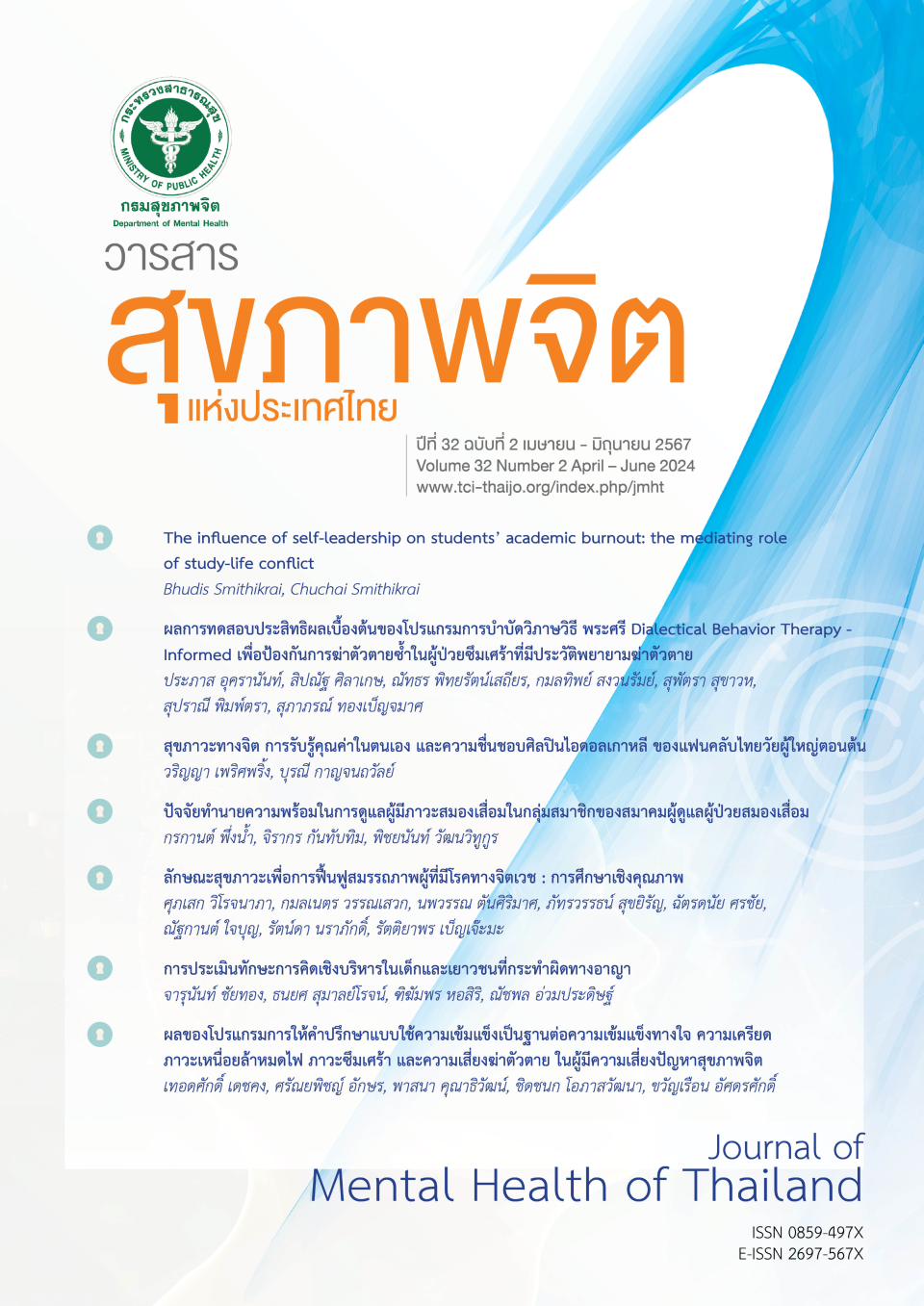ลักษณะสุขภาวะเพื่อการฟื้นฟูสมรรถภาพผู้ที่มีโรคทางจิตเวช : การศึกษาเชิงคุณภาพ
คำสำคัญ:
การฟื้นฟูสมรรถภาพ, การฟื้นคืนสู่สุขภาวะ, โรคทางจิตเวช, สุขภาวะบทคัดย่อ
วัตถุประสงค์ : เพื่อศึกษาลักษณะและมิติของสุขภาวะในบริบทการฟื้นฟูสมรรถภาพผู้ที่มีโรคทางจิตเวชในประเทศไทย
วิธีการ : การศึกษาเชิงคุณภาพ เก็บข้อมูลในเดือนมีนาคม ถึง เมษายน พ.ศ. 2566 จากการสนทนากลุ่มด้วยแบบสัมภาษณ์กึ่งโครงสร้างในคนไทยอายุ 18 - 59 ปี จาก 4 ภูมิภาค แต่ละภาคแบ่งกลุ่มผู้ให้ข้อมูลหลักเป็น 3 กลุ่ม ได้แก่ 1) กลุ่มผู้ที่มีโรคจิตเภท โรคอารมณ์สองขั้ว หรือโรคซึมเศร้าอย่างน้อย 2 ปีที่ดำรงชีวิตอย่างอิสระ 2) กลุ่มประชาชนทั่วไปที่มีรายได้สูงกว่ารายได้ขั้นต่ำ และ 3) กลุ่มประชาชนทั่วไปที่มีรายได้ต่ำกว่ารายได้ขั้นต่ำ รวม 12 กลุ่ม กลุ่มละ 6 - 10 คน วิเคราะห์ข้อมูลโดยการวิเคราะห์เชิงเนื้อหา
ผล : กลุ่มตัวอย่าง 115 คน อายุเฉลี่ย 41.1 ปี เป็นหญิงร้อยละ 67.0 ทั้งกลุ่มผู้ที่มีและไม่มีโรคจิตเวชมีความเห็นสอดคล้องกันว่าสุขภาวะที่ดี หมายถึง สถานะของการมีความสุข มีความพึงพอใจในการดำเนินชีวิตในมิติต่าง ๆ มีอิสระในการตัดสินใจ และเป็นส่วนหนึ่งในสังคม การวิเคราะห์เนื้อหาพบว่า สุขภาวะประกอบด้วย 8 มิติ ได้แก่ สุขภาวะทางร่างกาย จิตใจ สังคม สิ่งแวดล้อม จิตวิญญาณ การเงินและเศรษฐกิจ การงานและการเรียน และการเข้าถึงรัฐสวัสดิการที่ดี
สรุป : การฟื้นฟูสุขภาวะผู้ที่มีโรคจิตเวชจำเป็นต้องคำนึงถึงการดำเนินชีวิตในทั้ง 8 มิติของสุขภาวะ บนพื้นฐานของการตัดสินใจร่วมกันระหว่างผู้ใช้บริการและผู้ให้บริการ
Downloads
เอกสารอ้างอิง
Kittipeerachon M, Masiriwet P, Surarunsamrit B, Mekwilai V. Handbook of care for patients with schizophrenia for hospitals in the health area (physician edition). Nonthaburi: Department of Mental Health; 2016.
Chapel JM, Ritchey MD, Zhang D, Wang G. Prevalence and medical costs of chronic diseases among adult medicaid beneficiaries. Am J Prev Med. 2017;53(6S2):S143-54. doi:10.1016/j.amepre.2017.07.019.
GBD 2019 Mental Disorders Collaborators. Global, regional, and national burden of 12 mental disorders in 204 countries and territories, 1990-2019: a systematic analysis for the global burden of disease study 2019. Lancet Psychiatry. 2022;9(2):137-50. doi:10.1016/S2215-0366(21)00395-3.
Flyckt L. Regional care guidelines: schizophrenia and other psychosis. Stockholm: Stockholm County Council; 2008.
Jacob KS. Recovery model of mental illness: a complementary approach to psychiatric care. Indian J Psychol Med. 2015;37(2):117-9. doi:10.4103/0253-7176.155605.
Ramon S, Healy B, Renouf N. Recovery from mental illness as an emergent concept and practice in Australia and the UK. Int J Soc Psychiatry. 2007;53(2):108-22. doi:10.1177/0020764006075018.
Swarbrick P, Yudof J. Wellness in eight dimensions [Internet]. New Jersey: Collaborative Support Programs of New Jersey; 2017 [cited 2023 Dec 29]. Available from: https://cspnj.org/wp-content/uploads/2021/09/Wellness-8-Dimensions.pdf
World Health Organization. WHOQOL-BREF: introduction, administration, scoring and generic version of the assessment: field trial version, December 1996 [Internet]. Geneva: World Health Organization; 2012 [cited 2024 Feb 12]. Available from: https://www.who.int/publications/i/item/WHOQOL-BREF
Scheier MF, Wrosch C, Baum A, Cohen S, Martire LM, Matthews KA, et al. The life engagement test: assessing purpose in life. J Behav Med. 2006;29(3):291-8. doi:10.1007/s10865-005-9044-1.
Strauss A, Corbin J. Basics of qualitative research: techniques and procedures for developing grounded theory. 2nd ed. Los Angeles: Sage Publications; 1998.
Thai Health Promotion Foundation. Annual report 2003, Thai health promotion foundation [Internet]. Bangkok: Thai Health Promotion Foundation; 2011 [cited 2024 Feb 12]. Available from: https://www.thaihealth.or.th/?p=197201
Mongkol A, Huttapanom W, Chetchotisakd P, Chalookul W, Punyoyai L, Suvanashiep S. The study to develop Thai mental health indicator. Journal of the Psychiatric Association of Thailand. 2001;46(3):209-25.
Morosini PL, Magliano L, Brambilla L, Ugolini S, Pioli R. Development, reliability and acceptability of a new version of the DSM-IV social and occupational functioning assessment scale (SOFAS) to assess routine social functioning. Acta Psychiatr Scand. 2000;101(4):323-9.
Adams T, Bezner J, Steinhardt M. The conceptualization and measurement of perceived wellness: integrating balance across and within dimensions. Am J Health Promot. 1997;11(3):208-18. doi:10.4278/0890-1171-11.3.208.
Myers JE, Sweeney TJ, Witmer TM. The wheel of wellness counseling for wellness: a holistic model for treatment planning. J Couns Dev. 2000;78(3):251-66. doi:10.1002/j.1556-6676.2000.tb01906.x.
Schmidt E, Pacek AC, Radcliff B. The welfare state and human well-being around the world: a cross-national analysis. Appl Res Qual Life. 2024;19:365-80. doi:10.1007/s11482-023-10247-z.
Coombs NC, Meriwether WE, Caringi J, Newcomer SR. Barriers to healthcare access among U.S. adults with mental health challenges: A population-based study. SSM Popul Health. 2021;15:100847. doi:10.1016/j.ssmph.2021.100847.
Banthoengsuk H, Ngamsri M, Jaisawang D, Somsuvun C, Yaowaboot A. The relationships between self-care behaviors, self-esteem, and psychological well-being among older adults with chronic illness. Journal of Nurses Association of Thailand Northern Office. 2021;27(2):56-68.
Chinachoti P, Siriwong T, Chinachoti P. Factors affecting work happiness of before retirement employee in industry, Nonthaburi province. Dusit Thani College Journal. 2018;12(2):319-34.
ดาวน์โหลด
เผยแพร่แล้ว
รูปแบบการอ้างอิง
ฉบับ
ประเภทบทความ
สัญญาอนุญาต
ลิขสิทธิ์ (c) 2024 วารสารสุขภาพจิตแห่งประเทศไทย

อนุญาตภายใต้เงื่อนไข Creative Commons Attribution-NonCommercial-NoDerivatives 4.0 International License.
- ผู้อ่านสามารถนำข้อความ ข้อมูล จากวารสารไปใช้ไปใช้ประโยชน์ทางวิชาการได้ เช่น เพื่อการสอน เพื่อการอ้างอิง แต่การนำไปใช้เพื่อวัตถุประสงค์อื่น เช่น เพื่อการค้า จะต้องได้รับอนุญาตเป็นลายลักษณ์อักษรจากกรมสุขภาพจิตก่อน
- ความคิดเห็น ข้อมูล และบทสรุปต่าง ๆ ที่ลงตีพิมพ์ในวารสารสุขภาพจิตแห่งประเทศไทยเป็นของผู้เขียนบทความและมิได้แสดงว่ากองบรรณาธิการหรือกรมสุขภาพจิตเห็นพ้องด้วย




